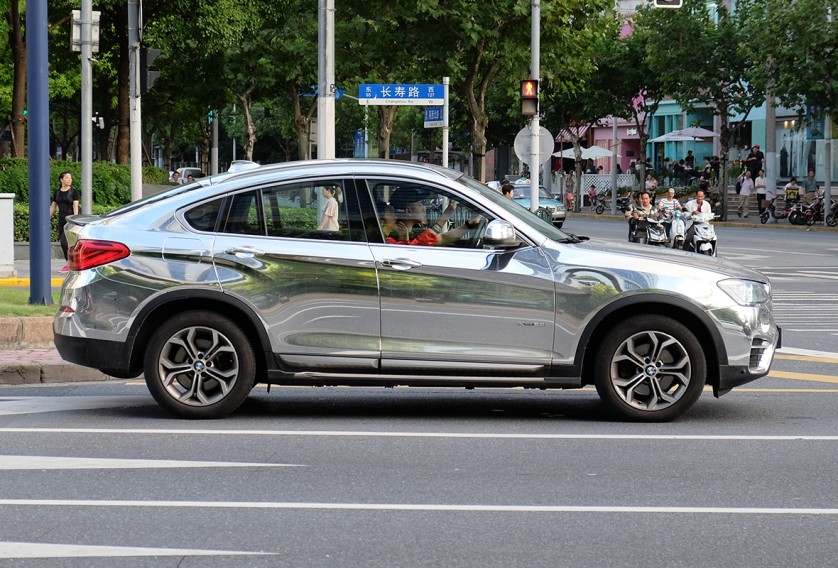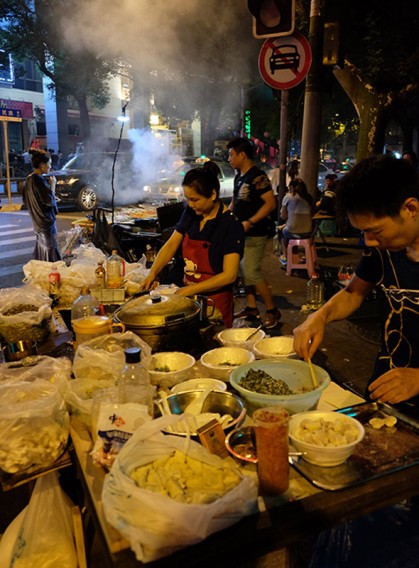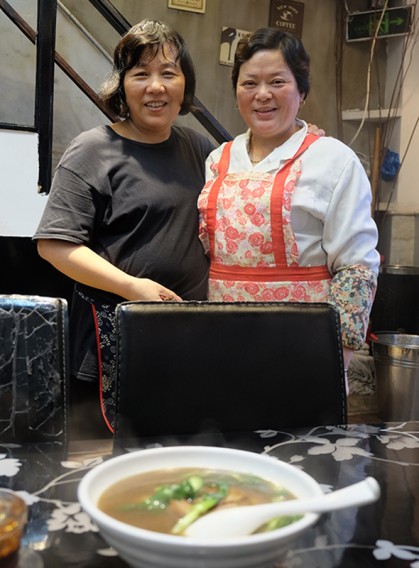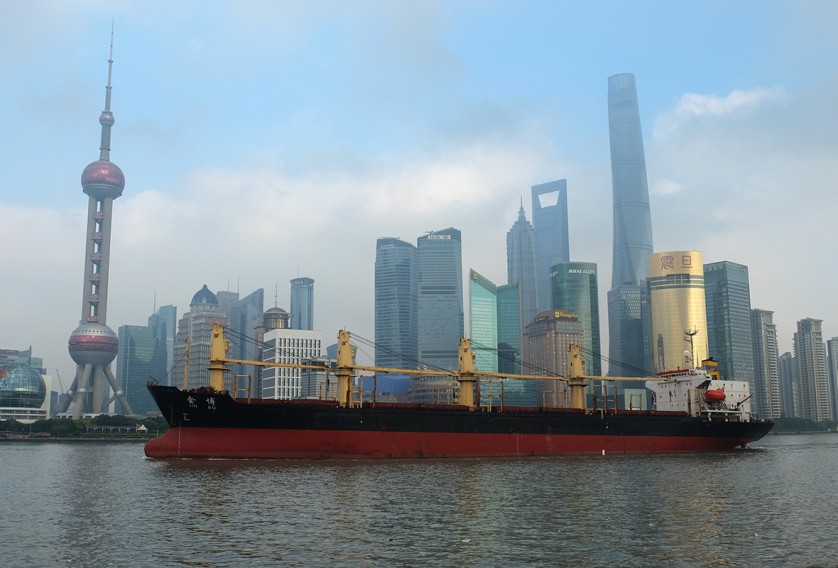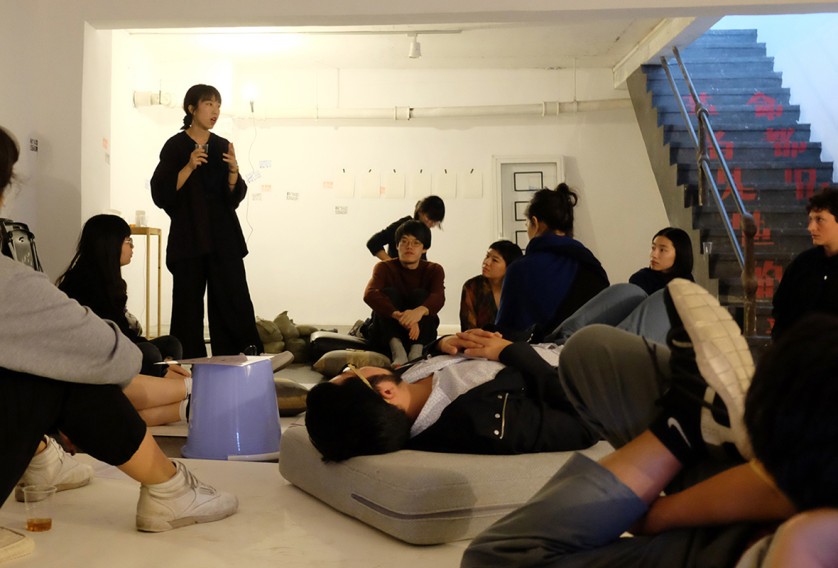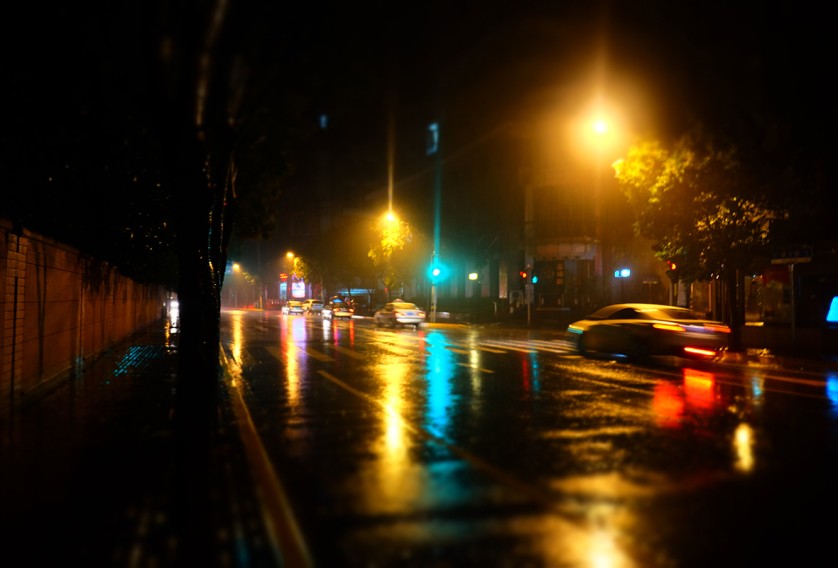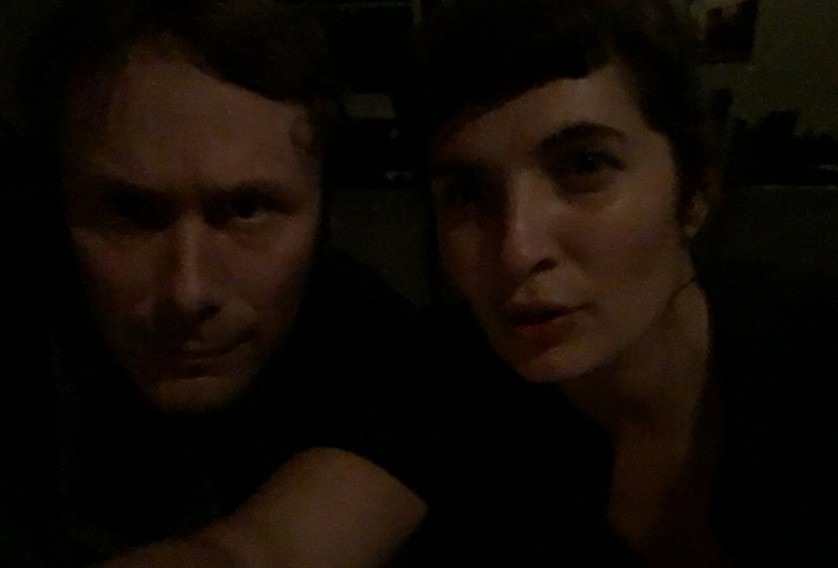Franz Schubert
Shanghai is the richest, most Westernised and probably the most multifaceted Chinese metropolis. Everything is in motion here, you will never get bored. Super luxury shopping streets are in the vicinity of derelict quarters, and social disparities are also huge. The accommodation is situated in a high-rise apartment hotel in a very central location in the French Concession, an ideal and privileged place to live in one of the world’s biggest cities. The building’s name is La Residence.
My colleague Hannahlisa Kunyik and I were lucky to get one single apartment each (the plan was to stay in a double apartment). At an estimated 30m², the apartment is relatively large for Shanghai and has an amazing abundance of storage space. My apartment (or “suite” according to the door plate) was on the 29th floor. Thanks to a south-facing end-to-end window front, the bedsit room had very pleasant light and a view of scaffolded twin towers. When you stand directly at the window (or move the desk there, as Hannahlisa Kunyik did two floors above me) you can see two additional, very impressive sections of the city. The double building site in front of the windows was a sleep killer at first (an in-ear headset served me fairly well later on), but the air-conditioner or music drowned out the construction noise quite well during the day. Indeed, you actually never can escape noise in China’s big cities.
The grant is connected with the Shanghai Theatre Academy (STA) that is dedicated to dramatic arts, musicals and related theoretical studies. As the STA does not focus on contemporary visual arts, there are hardly any links to it. The studio we shared was an office in the building of the International Theatre Institute (ITI). The internet speed there was much better than at the apartment. However, it is an office and has the usual opening hours (Mon-Fri from 8:00 a.m. to 8:00 p.m., closed on weekends and public holidays). Proper studio places are unaffordable at a reasonably central location. The office is situated in a colonial villa – a 20-minute bus ride away from the apartment – and is very, very quiet. Hannahlisa Kunyik already sought to get this office in advance so that it was available to us right from the start.
As I only produced digital works in Shanghai I mainly needed the office because of its faster internet connection. Sending mails with attachments may be very, very time-consuming at the apartment. Most of the time, however, I worked at the apartment itself as a desk, power supply and some internet access was sufficient form me.
By my standards, I was very productive and, accordingly, I put a lot of time into my work. For me, the stay in Shanghai was very successful also in artistic terms. Together with Niki Passath and Florian Schmeiser — curated by Alexandra Gaspar — I was invited to the 1st Longli International Media Art Festival in Longli (Guizhou province) and was able to finalise a 3D animation for it in Shanghai.
I had a half-botched screening (technical glitches) at a Parallel Asteroid concert in Basement6.
Then, I was able to implement a complex book project on the shanzhai phenomenon by means of various translation programs on site.
And towards the end of the residency, I produced a 3D computer animation for a screening at the Shenzhen International Animation Biennial.
| 1. | Dos & don’ts in this place: |
| Do's: Smartphones: Nowadays digital communication is almost exclusively based on smartphones in China. Therefore, you should absolutely bring a fairly up-to-date model. Without a proper command of Chinese, it is indispensable for navigating, communicating and planning trips. It is recommendable to use a reasonably recent device and prioritise the data volume over voice telephony in your subscriber contract. Also, it is recommendable to have a power bank and a charger cable for your smart phone with you. WeChat: WeChat currently is the main communication channel in China. It is a mix of Facebook and WhatsApp with less privacy. You can use it to send text, image, video and voice messages as well as animated stickers. In addition to video and voice telephony, it also supports payments (however only if you have a Chinese bank account). The QR code of one’s own WeChat account is about to replace the very popular business cards. Almost all institutions, museums, galleries, clubs, etc., have their own WeChat accounts and use them to distribute their newsletters. |
|
| Don'ts: Getting riled up about traffic is pointless. Best try to accept the situation right from the start, but it is not so easy to avoid getting worked up. Cars are allowed to turn on red. E-bikes also use pavements and are almost noiseless. |
|
| 2. | Where you can buy great supplies: |
| Fouzhou Rd. (to the south of West Nanjing Rd.): a street full of shops for art and office supplies, copy shops and (in part international) bookshops.Xing Guang Photographic Equipment City (Luban Rd.) is a multi-storeyed shopping mall for cameras, lenses, tripods (also second-hand products) with adjacent print shops. | |
| 3. | On art at my residency-place I can say this: |
|
There are a very large number of art institutions with international programmes in Shanghai, commercial galleries serve a very broad, wealth customer base. The scene is very much commercially driven (this is also why luxury malls such as K11 have an art space) and at first, makes a rather hermetic impression. www.basement6collective.com |
|
| 4. | Around the studio – this is where I go shopping, drink a coffee and get the best lunch specials within walking distance: |
| Shopping: There is always a supermarket within walking distance. It feels as if there is a 24/7 shop every 100 metres so that the very basic necessities are available around the clock. From 10:00 p.m. on street food is offered at almost every corner…Coffee is usually not good and outrageously priced — so, drink tea!Lunch: The nearest place where several tables are already occupied is always the best one. The choice of restaurants is enormous and the food is almost always fantastic.Eat local food! The more people, the better. As all dishes are shared, you can try much more. If possible, take along locals and let them select the restaurant. In that case, remain silent when they order food. In my opinion, courage is always rewarded. Queuing up, too. Turtle is a no go! | |
| 5. | Where I like to spend the evening (dinner, drinks and best sound): |
| Weather permitting, street food is fun and inexpensive. B6 Events are very nice. There is always something going on in Shanghai; to get the event calendar and flyers subscribe to WeChat. | |
| 6. | What I would have liked to know about the studio already at the start of my residency: |
| The metro card can also be used for taxis, metro service ends at 10:30 p.m. Screenshots of addresses in Chinese script make communication with taxi drivers easier. In comparison with Vienna, taxis are very inexpensive, and bicycles too. Take along your favourite toothpaste, etc. (in many cases, replacements are impossible to find or very expensive)Adjust the withdrawal limit of your ATM card for foreign countries. Take along earplugs for sleeping. Bring your own data cable, Ethernet is somewhat faster than WiFi.Take along Austrian stamps (mail dropped at the consulate general is sent to the Foreign Ministry in Austria and, if provided with stamps, can be mailed on. Otherwise somebody has to pick it up…) There is a reception on Austria’s national day at the Hyatt on the Bund — with Leberkäse bread rolls. Go to the Shanghai/Beijing opera at least once, it is adorable. Hearing protection is recommendable as it is very loud and the sound is distorted with much treble. Many hotels in China are not licensed to accommodate foreigners and do not accept them under any circumstances because of high fines. Best clarify that in advance. Domestic flights very often are extremely delayed. Flying sometimes costs less than taking a train. Best make your reservations on Ctrip. |
Website resident: schbrt.com

